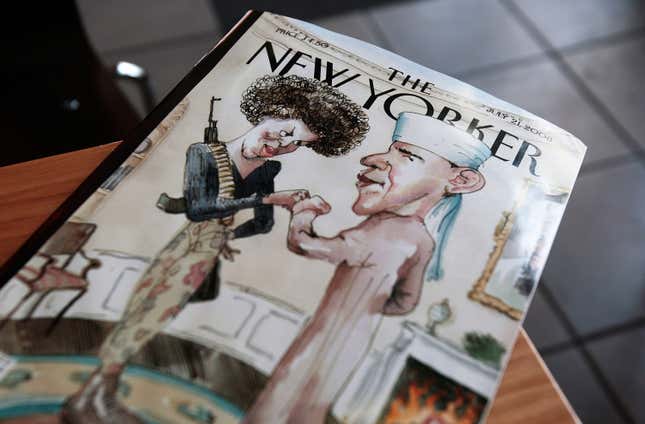
An editor at the New Yorker, one of the country’s most influential magazines, accuses the magazine of firing her after she pointed out longstanding racial and gender inequities at the publication, and she says she’s not taking it lying down.
Erin Overbey, who is white, had worked at the New Yorker since 1994, according to her Twitter profile, and was the magazine’s archive editor when she was let go. In a long thread, Overbey admits that she had been under a performance review since June 17 but insists it only came about after she repeatedly sent emails and tweets about the magazine’s lack of gender and racial diversity.
That includes accusations that the New Yorker hadn’t assigned a Black editor to work on a feature—the large pieces that include cover stories and other important stories in any magazine—in nearly 15 years, Overbey tweeted. That would mean the New Yorker effectively lacked any Black editorial supervision over its most important stories since before Barack Obama took the oath of office.
“This seemed to me to be a major issue of concern,” she tweeted. “If less than 10 longform feature pieces (ie, excluding Fiction, Talk, Poetry) are edited by a senior Black editor within a 14-year span (w/~ 230 feature pieces pub’d a yr) at a magazine w/such a huge influence, something is wrong.”
Overbey also said that she discovered that the male editor who previously held her job had been paid 20% more than she was while not meeting the minimum requirements for the job description.
Her bosses, she said, loathe the fact that she tracked of and spoke out about the discrepancies. In September 2021, she posted an exhaustive Twitter thread calling out her then-employer and the entire journalism industry for its racism.
“White people are rarely actively racist at these publications,” Overbey wrote. “They simply never bother to challenge the status quo—typically out of concern that they will be inconvenienced or made to feel uncomfortable. And so the status quo often remains entrenched for literally decades.”
She followed with receipts from the New Yorker archive that it was her job to maintain: In a 30 year span, the New Yorker had published only four book reviews by Black women, only 5% of all its profiles between 1990 and 2020 had Black writers, and so forth.
The New Yorker is owned by Condé Nast, a publisher that also owns Vogue, GQ and Vanity Fair among other publications. The company publishes an annual diversity and inclusion report which in 2021 showed that 65% of its U.S. editorial staff was white, with “people of color” making up 28%. Specifically, Black journalists made up 9% of its editorial staff, while those identifying as Hispanic or Asian represented 5% and 10% respectively.
Among the New Yorker’s Black staffers are Jelani Cobb, an essayist on race and politics who in May was named the dean of Columbia University’s journalism school, Vinson Cunningham, a theatre and literary critic and Doreen St. Felix, the magazine’s TV critic.
“The New Yorker prides itself on professionalism, accuracy, and adherence to the highest journalistic standards. False allegations that malign our journalistic integrity and that attack colleagues are inappropriate and unacceptable in our workplace,” a Condé Nast spokesperson said in a statement after Overbey’s September tweetstorm.
Overbey’s tweets might feel like inside baseball in a declining industry long known for institutional racism and lack of diversity in its coverage, especially given a new set of digital publications and social media has opened new lanes for nonwhite writers and content creators in recent years. But the 97-year-old New Yorker still claims more than a million subscribers and like many traditional media outlets still has outsized influence among policymakers and others in powerful spaces.
Overbey posted her first round of tweets last September as the journalism industry broadly was being confronted with and in some instances issuing mea culpas for propping up institutional racism.